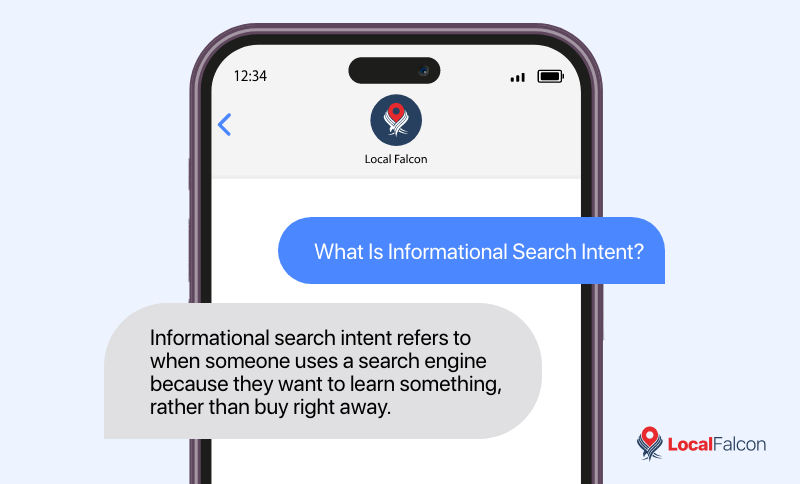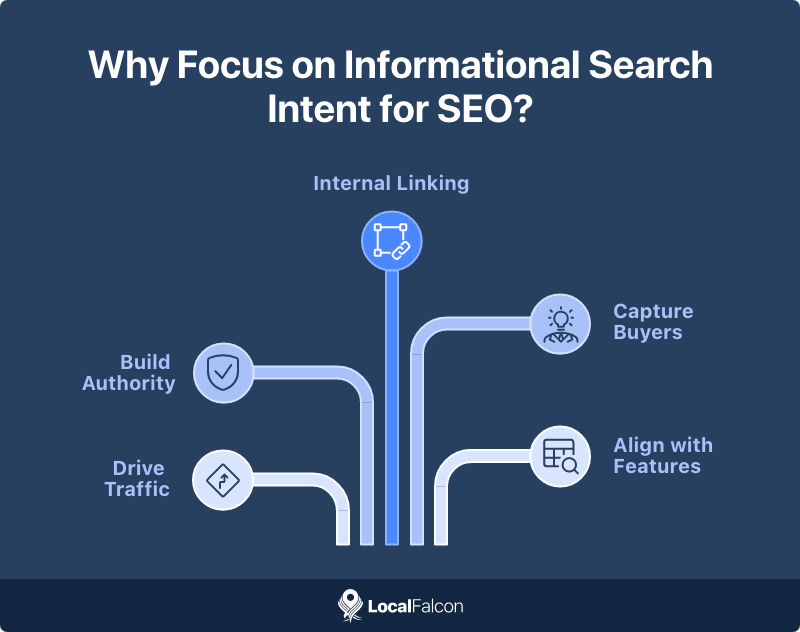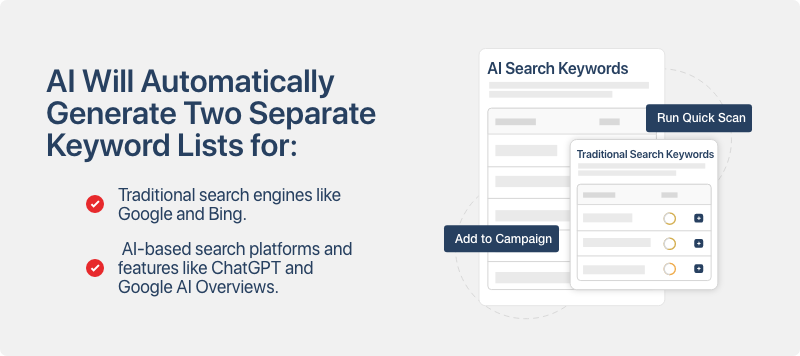When it comes to local search intent, keywords can generally be categorized into one of four categories: navigational, commercial, transactional, and informational search intent keywords.
Targeting navigational, commercial, and transactional keywords is key to any local SEO strategy, as these signal that potential customers are ready to visit a nearby business, are evaluating different local businesses to choose from, or are looking to book a service or make a purchase.
But what about informational intent keywords? Can they drive sales, too? Keep reading to find out everything you need to know about informational search intent and local SEO.
What Is Informational Search Intent?
Informational search intent refers to when someone uses a search engine because they want to learn something, rather than buy right away. These searches are typically questions or research-based queries. The user is looking for facts, explanations, how-to guides, or deeper understanding, not making a transaction.
In the world of local search, informational search intent can be closely related to commercial intent, as there's often a research phase involved before someone determines they need to buy something from a business in their area. For example, someone might research teeth whitening before deciding to compare nearby dentists who offer the service. They might also be looking for the "best" something near them (i.e., looking for information such as reviews or articles about the best of a certain type of restaurant near them).

The Different Types of Informational Intent Keywords: Traditional Search vs. AI Search
These days, keywords are no longer simply categorized as short- or long-tail. While these distinctions are still important, it's also crucial to understand the difference between traditional search keywords and AI search keywords.
Informational intent keywords for traditional search engines, such as Google and Bing, aren't necessarily phrased as complete sentences or questions. For instance, someone might Google something like "teeth whitening cost" before deciding to book a teeth whitening appointment with a local dentist.
On the other hand, when people search using AI tools, like ChatGPT, Claude, or Gemini, they tend to phrase things more similarly to how they actually speak, resulting in what's known as conversational or natural language queries. Indeed, people are increasingly using AI platforms for voice search, and they're asking longer, more naturally phrased questions like "how much does teeth whitening cost in [City]?" or "where should I travel to get dental work done to save money?"
Why Does Informational Search Intent Matter for SEO?
Informational search intent matters for SEO because it captures users at the top of the sales funnel, when they're actively looking to learn, research, or solve a problem (that your business can help them solve). This is important because it does all of the following.
1. Drives High-Quality Organic Traffic
People with informational search intent are often looking for answers to specific questions related to goods or services that a business offers. If your content ranks well for those queries, you can bring in consistent, relevant traffic without paid ads.
2. Builds Authority and Trust
By providing helpful, well-researched information, your site becomes a trusted source. This can boost your E-E-A-T signals (Experience, Expertise, Authoritativeness, Trustworthiness), which Google considers in its rankings.
3. Creates Opportunities for Internal Linking
Informational content, on a blog or elsewhere on your site, is perfect for linking to deeper resources, service pages, or product pages. This guides users through the funnel while helping search engines understand your site structure.
4. Captures Early-Stage Buyers
Even if someone isn't ready to buy, informational content puts your brand on their radar. When they do move to a decision stage, you're more likely to be remembered and trusted.
5. Aligns with Featured Snippets, AI, and Voice Search
Informational queries are often phrased as questions. If your content answers them clearly and concisely, you increase your chances of ranking in featured snippets, People Also Ask boxes, and AI-generated responses and overviews.

How Informational Intent Keyword SEO Can Drive Sales for Local Businesses
Let's take a look at how targeting keywords with informational search intent could help a local business increase visibility across local search and, ultimately, drive more sales.
Imagine a local dentist, landscaper, or contractor. They already rank for some basic service terms like "teeth cleaning near me" or "landscaping company in [City]." But that only captures people who are ready to buy right now. What about the people still researching?
Creating content that answers common questions (things like "how often should I get a dental cleaning," "how to reduce utility costs with landscaping," or "what to do if my window won't close properly") can help the business start showing up earlier in the customer's journey. These are top-of-funnel searches that don't always have clear commercial or transactional intent at first, but they represent people who will need a local service soon.
When those readers land on the business's blog or resource section and find helpful, locally relevant information, a few things happen:
- The business builds credibility and trust.
- The content often ranks well in Google's blue-link organic results and can appear in featured snippets or even AI Overviews.
- Some of those visitors return later, or may even convert on the spot if they're ready to buy after finishing their research.
In short, including informational intent keywords as part of your local SEO keyword strategy helps grow your visibility, build brand authority and recognition, and drive future conversions. Those conversions may not even be that far off, either, especially if you focus on making it easy for someone to take the next step when they're ready! Try linking to a service page within or including a contact form at the bottom of an informational blog post.
How Can You Find Local Keywords with Informational Intent?
So, now you understand how informational search intent can help you drive local business. But how do you actually find informational intent keywords for SEO, let alone ones that are specifically relevant to your local area?
That's where Local Falcon's Local Keyword Research Tool comes in. Instead of guessing which keywords people might be searching with in your area, you can simply enter a business location and a seed keyword, and the AI will automatically generate two separate keyword lists:
- One tailored for traditional search engines like Google and Bing.
- Another optimized for AI-based search platforms and features like ChatGPT and Google AI Overviews.
Each keyword comes with AI-powered reasoning that explains why it was suggested, along with a clearly labeled search intent category (navigational, informational, commercial, or transactional). This gives you instant insights into how people are searching in your area and helps you build local SEO-friendly content that aligns closely with their intent.

Whether you're creating educational blog posts, answering common customer questions in an FAQ section, or optimizing service pages, this tool helps you focus on the keywords that actually matter in your local market.
Final Thoughts
Targeting informational search intent exposes your brand to potential customers wherever they are in their buying journey.
For local businesses, creating content around informational intent keywords can build visibility (including AI visibility), authority, and trust early on, increasing the chances that those searchers become paying customers down the line.
When created strategically as part of a comprehensive local keyword strategy, informational content doesn't just educate, it sells!


